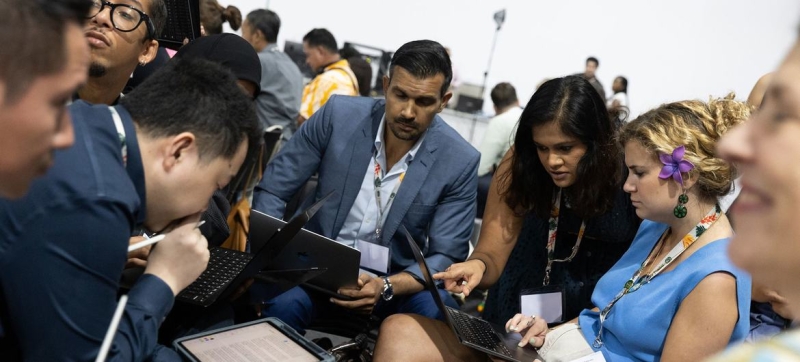
Negotiations will continue at COP 30 in Belem, Brazil. COP30: What’s at stake in the Brazil talks? Climate and Environment
Negotiations at the UN Climate Conference (COP 30) in Belém, Brazil, were suspended on Thursday after a fire broke out at the event site due to the evacuation of more than 190 delegations were forced to adjourn discussions. The summit is due to end on Friday, and before the fire, countries were engaged in intense discussions on divestment from fossil fuels and climate finance.
The outcome of the negotiations is widely seen as an indicator of whether decades of promises can be turned into action.
In practical terms, discussions at COP 30 are centered around three key issues:
1. How to accelerate climate action?
Against the backdrop of record warming of the planet and more frequent natural disasters, reducing emissions and adapting to the consequences of climate change remain at the top of the agenda. Delegates discuss key instruments:
- National Determined Contributions (NDCs): National climate plans updated every five years. At COP 30, countries are considering new ways to expand global ambition and accelerate action.
- Fossil fuel phase-out: At COP28, a phase-out of fossil fuels was agreed upon in 2023. Delegates are now discussing whether to develop a clearer road map with certain conditions. necessary funding. One of the proposals at COP-30 is to triple investment in adaptation this year.
- Global goal on discussed about 100 indicators to track progress at the global level.
- Roadmap for Financing Forest Protection: Already supported by 36 countries, representing 45 percent of global forest cover and 65 percent of global GDP. The goal is to close the $66.8 billion annual shortfall for tropical forest conservation and restoration.

Delegate to the UN Climate Conference in Belem, Brazil.
2. How to ensure access to finance and technology for those who need it most?
Political promises alone will not solve the climate crisis— real resources are required. At COP-30, mechanisms for their mobilization are discussed:
- Article 9.1 of the Paris Agreement: developed countries are obliged to provide financial support to developing countries. Delegates review action plan and accountability mechanisms.
- Baku Belen Roadmap: Proposal to mobilize $1.3 trillion annually for developing countries using non-creating debt tools.
- Loss and Damage Fund: Created at COP 27 and officially launched during COP 28, the fund aims to help countries most affected by the impacts of climate change. The fund didn’t receive enough funds for COP 30 – many summit participants are calling for more contributions.
- Green Climate Fund: The world’s largest climate fund, but recent rounds of funding have shown a trend towards reducing contributions.
- Global Environment Facility: Provides grants to developing countries, but its resources are also considered insufficient.
- Technology Adoption Programme: aims to increase access to climate technologies; negotiations complicated by disagreements over financial and trade barriers.
- Unilateral trade measures: climate-related trade measures that could harm developing countries; the idea of creating a platform to assess their impact is being considered.
3. How to ensure climate action is fair and inclusive?
Even with funding major changes could increase inequality if the needs of the most vulnerable are not addressed. Delegates discuss the mechanisms of a just transition:
- Program of work on the paths of a just transition: aimed at ensuring social justice, decent working conditions and sustainable development. Countries look forward to developing a practical framework that takes into account the interests of workers and local communities. Gender Action Plan: Helps integrate a gender perspective into climate policy. The first such plan was adopted in 2017, and at KS-30 an updated version should be agreed upon.
Why decisions in Belene important
Decisions taken in Belém will determine whether the goals set out in the Paris Agreement are achievable. There is an air of urgency at COP 30: time is running out, consensus is needed.
These decisions will determine not only the pace of emissions reductions, but also whether climate justice will be ensured for indigenous peoples, African countries and developing countries who suffer the most from the consequences of the climate crisis, despite the fact that they are least involved in its creation.
